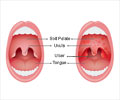Research has proved that a new drug named histatin, a naturally occurring antifungal agent in saliva kills the fungus- Candida albicans, which is
Research has proved that a new drug named histatin, a naturally occurring antifungal agent in saliva kills the fungus- Candida albicans, which is responsible for most HIV-related oral infections.
It is known that candidiasis, also known as thrush, is a disease characterized by whitish spots and ulcers on the membranes of the mouth, tongue and throat. It primarily affects people with weakened immune systems caused by antibiotics, chemotherapy or diseases such as AIDS. Denture wearers may also be affected. It can be treated by antifungal medications in otherwise healthy people, but it is harder to treat in people with compromised immunity and can be deadly if it infects vital organs.It was known that histatin usually can keep Candida albicans in check among healthy people with enough saliva, but the mechanism of action of the drug was not known.It was discovered through studies that histatin binds to a specific membrane protein called TRK1p, which regulates potassium ion flow through the cell membrane of Candida albicans. This allows the cell to regulate its volume. It is said that the binding action of histatin acts like a foot in the door. Blocking the channel open allows a lethal unregulated flow of potassium and other essential molecules into and out of the cell.
Now that the target for histatin has been identified, a better protein can be designed that will even be more effective in holding the channel open, allowing even better and more rapid killing of the fungus. In addition, many other pathogenic fungi that cause disease in elderly individuals or AIDS patients also should be able to be killed by histatins or drugs designed to target their potassium channels.






